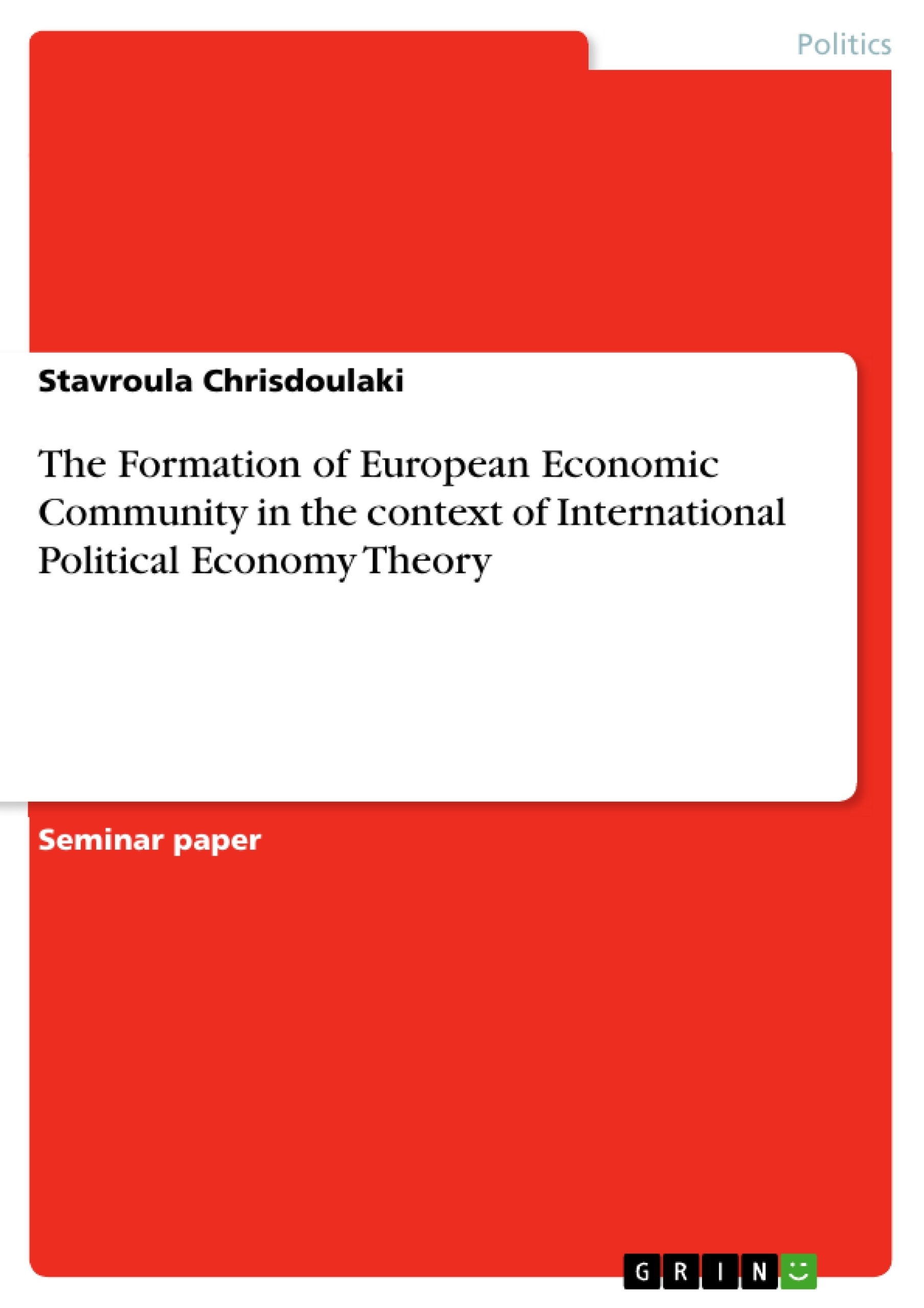The European Union (EU) is considered as a unique institutional structure not only because of the transfer of the national sovereignty in a supranational level but mostly because of its long term existence and expansion. Although the institutional structure of the EU is much different and undoubtedly improved from the one of the European Economic Community (EEC) the study of the initiating process, namely the EEC, is essential in order to understand what the basis of the recent EU is. Hence, the research for the initiating process of the EEC and sequentially the international context in which the EEC was formed are of great importance not only for the academic scholars but mostly for the European citizens.
The concern of this study is the formation of the EEC under the International Political Economy theory (IPE), which emerged mainly after the Second World War and expanded in the decade of 70s. The cooperation of the leader European states in the formation of this institutional structure and its main task of European cooperation and adoption of common policies in order to achieve the demanded goal of economic development and prosperity is mainly based on the International Political Economy theory, since the last addresses the interaction of international relation and political economy. The first part of this study is devoted to the analysis of the International Political Economy and forms the theoretical framework of the study. Moreover, it presents the variety of the IPE and stresses its main aspects. Following, there is an introduction of the formation of the EEC and a short analysis of the political economies of the member states, which is helpful in order to have an overview of the different economies and the possible implications for the formation of the EEC. Finally, the conclusion consists of the outputs of the theoretical framework combined with the analysis of the economic situation of the different countries and attempts to present the causal relation between IPE and the formation of EEC.
Inhaltsverzeichnis (Table of Contents)
- A. Introduction
- B. International political economy theory (IPE)
- B.1 What is IPE?
- B.2. The aspects of IPE.
- B.3. Game theory and IPE
- C. Introduction to European Economic Community (EEC)
- C.1. The economic situation of the EEC member-states....
- D. Conclusion
Zielsetzung und Themenschwerpunkte (Objectives and Key Themes)
This study examines the formation of the European Economic Community (EEC) through the lens of International Political Economy (IPE) theory. It analyzes the role of IPE in shaping the cooperation between leading European states in the creation of this institutional structure, focusing on the interplay of international relations and political economy in achieving economic development and prosperity.
- The emergence and development of IPE theory.
- The economic and political landscape of the EEC member states.
- The impact of trade policies and international finance on the global economy.
- The interplay of national sovereignty and international integration.
- The role of IPE in shaping the formation of the EEC.
Zusammenfassung der Kapitel (Chapter Summaries)
- A. Introduction: This chapter sets the stage by introducing the European Union (EU) as a unique institutional structure and highlighting the importance of understanding the EEC formation as a foundation for the current EU. It outlines the study's focus on analyzing the formation of the EEC within the framework of IPE theory.
- B. International political economy theory (IPE): This chapter delves into the origins and development of IPE theory, particularly emphasizing its emergence in the 1970s following the oil crisis and the collapse of the Bretton Woods system. It explores the core concepts of IPE, its scope as a field of study, and its relevance in a globalized world.
- C. Introduction to European Economic Community (EEC): This chapter provides an overview of the formation of the EEC and examines the economic situations of its member states. The chapter aims to provide a context for understanding the potential implications of these different economies for the formation of the EEC.
Schlüsselwörter (Keywords)
The main keywords and focus topics of this study include International Political Economy (IPE), European Economic Community (EEC), European Union (EU), trade policies, international finance, national sovereignty, and economic development.
Frequently Asked Questions
What is International Political Economy (IPE)?
IPE is a theory and field of study that addresses the interaction between international relations and political economy, focusing on how global politics affects global markets and vice versa.
How does IPE explain the formation of the EEC?
IPE suggests that the cooperation of European states was driven by the need for economic development, prosperity, and the management of international trade and finance after WWII.
Why is the study of the EEC important for today's EU?
Understanding the initiating process of the European Economic Community (EEC) is essential to comprehend the institutional basis and long-term expansion of the modern European Union.
What role does national sovereignty play in the EEC?
The formation of the EEC involved a unique transfer of some national sovereignty to a supranational level to achieve common economic goals and policies.
When did IPE theory emerge?
While it has roots in older political thought, IPE emerged as a distinct academic field mainly after the Second World War and expanded significantly in the 1970s.
- Quote paper
- Stavroula Chrisdoulaki (Author), 2010, The Formation of European Economic Community in the context of International Political Economy Theory , Munich, GRIN Verlag, https://www.grin.com/document/160558



